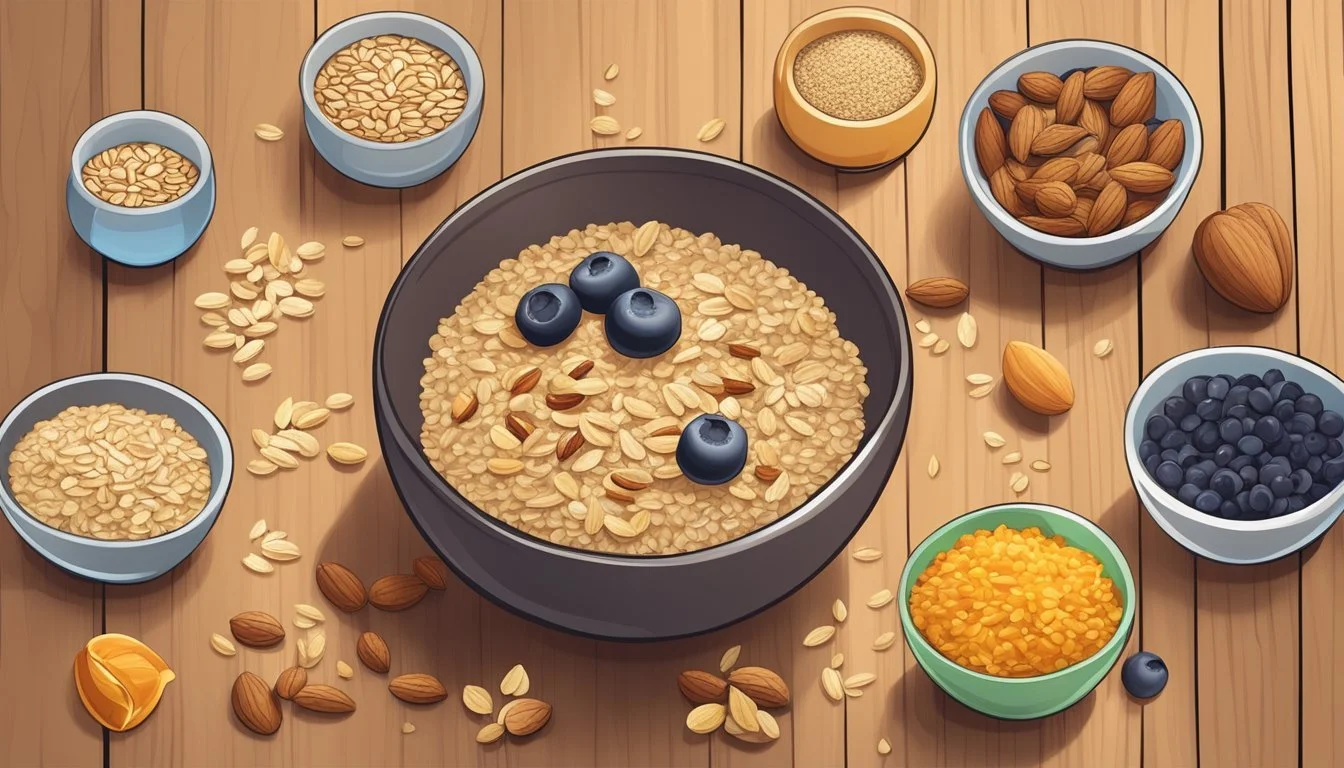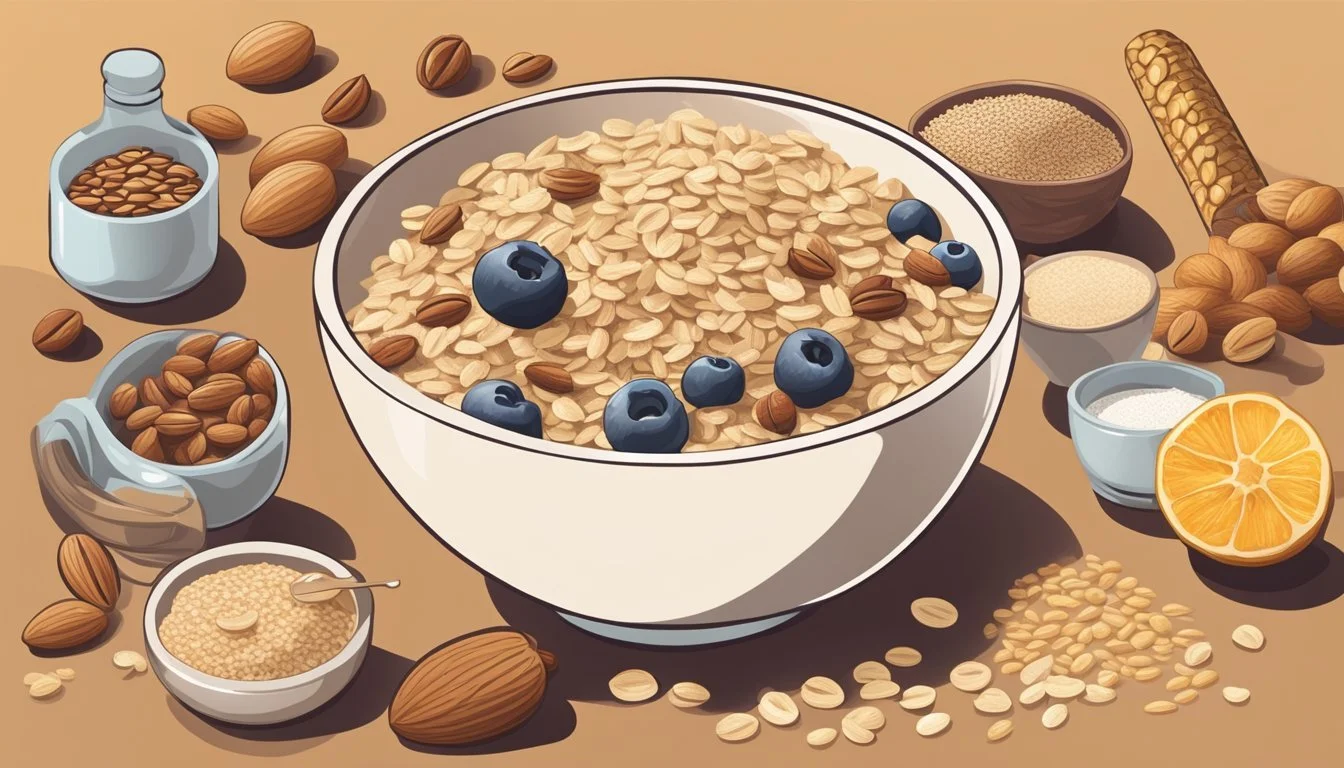Instant Oats Substitutes
Top Alternatives for Your Pantry
For those looking to vary their breakfast routine or accommodate dietary preferences, several substitutes for instant oats can offer comparable nutritional benefits without compromising on convenience. Quinoa and buckwheat, for example, are excellent alternatives that provide a higher protein content, with quinoa offering around 8 grams per cooked cup and buckwheat offering about 6 grams per cooked cup. These substitutes not only match the fiber content of instant oats but also come packed with healthy fats and essential nutrients.
Another versatile substitute is amaranth. By cooking it with a 1:3 ratio of amaranth to water, or 1:4 for a creamier texture, this nutty-flavored grain can easily be integrated into various dishes such as smoothies, salads, soups, and baked goods. Amaranth’s unique profile makes it a nutritious and appealing option for those seeking an alternative to oatmeal.
For those interested in a more textured experience, coconut chips can serve as a unique no-bake substitute for instant oats. By swapping oats with coconut chips in a one-to-one ratio, you can enjoy a different, yet equally delicious, outcome that adds a distinctive crunch and flavor to your recipes. Exploring these substitutes can open up new culinary possibilities while keeping meals nutritious and satisfying.
Understanding Oats and Their Nutritional Profile
Oats are a versatile and nutritious food staple, offering a range of health benefits. With various types of oats available, each provides unique textures and nutritional content that cater to different dietary needs.
Types of Oats
Oats come in several forms, each processed differently to suit various culinary uses. Whole oat groats are the least processed, preserving the most nutrients but taking longer to cook. Steel-cut oats, made by chopping groats into pieces, offer a chewy texture and take about 20-30 minutes to prepare. Rolled oats or old-fashioned oats are steamed and rolled flat, cooking faster than groats but retaining much of their texture and nutritional content.
Quick oats are further processed to cook even faster, often in about 1-2 minutes. These are thinner and have a softer texture. Instant oats are the most processed, designed for convenience with the shortest cooking time. They require only hot water and are often pre-flavored or sweetened.
Health Benefits of Oats
Oats are rich in nutrients that offer various health benefits. They are an excellent source of fiber, particularly beta-glucan, which can help lower cholesterol levels and improve heart health. Protein, providing about 5.5 grams per 1/2 cup of instant oats, supports muscle repair and growth.
Vitamins and minerals found in oats, such as B vitamins, iron, and magnesium, contribute to energy production, red blood cell formation, and maintaining healthy bones. Oats also have a low glycemic index, making them suitable for blood sugar management. For those with celiac disease or gluten sensitivity, oats are naturally gluten-free, but it's essential to ensure they are processed in gluten-free facilities to avoid cross-contamination.
The Importance of Consistency and Texture
The consistency and texture of oats can significantly impact their culinary uses and individual preferences. Rolled oats and steel-cut oats have a hearty texture, making them ideal for breakfast bowls and baking. Quick oats offer a smoother texture, suitable for quick meals and adding to recipes for a less chewy bite.
Instant oats provide a creamy consistency, perfect for quick breakfasts or adding body to smoothies. Understanding the desired consistency and texture helps in choosing the right type of oats for different dishes, ensuring both nutritional benefits and culinary satisfaction are met.
Instant Oats Substitutes for Various Needs
When it comes to finding substitutes for instant oats, one must consider factors like nutritional value, cooking time, and the specific culinary use. Here are some substitutes for baking, gluten-free needs, and grains that can effectively replace instant oats in various recipes.
Substitutes for Baking
When baking treats like cookies, bread, muffins, and pancakes, some excellent substitutes for instant oats include:
Old-Fashioned Oats: While these require slightly longer cooking time, they offer a similar texture and nutritional profile. Use in a 1:1 ratio with instant oats.
Quinoa Flakes: Quicker cooking than whole quinoa, these flakes can be used in baked goods and offer a high-protein alternative. They also provide a good amount of fiber.
Buckwheat Groats: These can be partially ground and used in place of oats for a nutty flavor and a gluten-free option. They are particularly good in cookies and muffins.
Gluten-Free Options
For those with celiac disease or gluten intolerance, numerous substitutes exist which are both gluten-free and nutritious:
Quinoa: High in protein and fiber, quinoa is versatile and can be used in various dishes, from oatmeal to baked goods.
Amaranth: Known for its nuttier flavor, amaranth can be used in recipes needing a creamier texture. Cook it using a 1:3 ratio with water.
Rice Flakes: Similar to rolled oats in texture, rice flakes are an excellent replacement for making gluten-free granola bars.
Grains as Substitutes
Whole grains can serve as excellent oatmeal alternatives, providing similar or enhanced nutritional benefits:
Millet: This grain is easy to cook and can be used in porridge, providing a mildly sweet flavor. It cooks relatively quickly and is rich in magnesium.
Brown Rice: Cooked brown rice can be used in recipes requiring a chewy texture. It's particularly good for making hearty breakfast bowls.
Barley: Though not gluten-free, barley can replace oats in many recipes, offering a rich, nutty flavor and high fiber content.
Each substitute can meet various dietary and cooking needs without sacrificing flavor or texture.
Non-Grain Alternatives for Instant Oats
For those looking to avoid grains, there are plenty of nutritious and satisfying substitutes for instant oats. These options are packed with protein, healthy fats, and unique flavors, offering a versatile addition to any meal.
Seeds and Nuts
Seeds and nuts are excellent non-grain alternatives. Chia seeds are a powerhouse of protein and healthy fats, providing a creamy texture when soaked in liquid.
Flaxseeds offer a nutty taste and are high in omega-3 fatty acids.
Nuts like almonds can be ground into almond meal, providing a slightly sweet and nutty flavor. These ingredients can be added to smoothies, baked goods, or eaten as a porridge-like dish.
Other Plant-Based Options
Other plant-based options include ancient grains and plant-based products. Quinoa flakes and buckwheat groats, though not true grains, are nutrient-rich and can be prepared similarly to oats.
Flattened rice, available as white or brown rice flakes, offers a mild flavor suitable for porridge or breakfast bars.
Amaranth is another good choice; its nutty flavor works well in a 1:3 or 1:4 ratio with water for cooking. These alternatives provide diverse textures and flavors, enriching any diet aimed at avoiding grains.
Additional Ingredients to Enhance Substitutes
Enhancing oat substitutes with additional ingredients can significantly elevate their flavor and nutritional value. Key ingredients in this process include fruits, spices, and sweeteners, which all contribute unique tastes and benefits.
Fruits, Spices, and Sweeteners
Fruits: Adding fruits such as berries, bananas, or apples provides natural sweetness and a nutritional boost. Berries are rich in antioxidants, making them a great addition to overnight oats or smoothies. Bananas add a creamy texture and are high in potassium. Diced apples offer a satisfying crunch and are packed with vitamins and fiber.
Spices: Spices play a crucial role in enhancing flavor without adding extra calories. Cinnamon is a popular choice and pairs well with most oat substitutes, giving a warm, sweet note. Nutmeg adds a slightly nutty flavor, while ginger introduces a spicy kick. For an exotic touch, cardamom can be used sparingly.
Sweeteners: Natural sweeteners like honey, maple syrup, and agave nectar can enhance the taste without the need for refined sugar. Honey offers antibacterial properties and pairs well with fruit. Maple syrup gives a distinctive, robust flavor ideal for granola. Agave nectar provides a mild sweetness perfect for smoothies and overnight oats.
By incorporating these ingredients, one can transform simple oat substitutes into delightful, nutritious meals.




